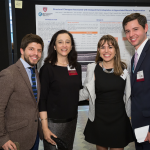Survival of mass extinctions helps to explain the near indestructible properties of hospital “superbugs”
Hospital “superbugs” have become a serious public health issue, but a new study shows that this type of antibiotic-resistant bacteria is far from new.
Crawling onto Land
Researchers at Mass. Eye and Ear, in partnership with the Broad Institute, have found that a leading hospital superbug, known as the enterococci, arose from an ancestor dating back 450 million years — about the time when animals were first crawling onto land (and well before the age of dinosaurs). The findings were published online in Cell, earlier this month.
Enterococci have emerged over the last 30 years as leading antibiotic-resistant pathogens. The researchers analyzed the genomes and behaviors of enterococci to better understand the microbes’ natural resistance to dryness, starvation, disinfectants and many antibiotics — and how the evolutionary history of these organisms can impact care today.
From Paleozoic Origins to Modern Hospitals
That this type of bacteria survived mass extinctions helps explain the nearly indestructible properties of hospital superbugs and could have implications for treatment and prevention.
When we discussed the finding with senior author Michael S. Gilmore, Ph.D., director of the Infectious Disease Institute at Mass. Eye and Ear and Principal Investigator of the Harvard-wide Program on Antibiotic Resistance, he said:
We asked ‘What led to the emergence of this whole new genus, Enterococcus, with properties that allow pathogenic strains to thrive in the hospital and emerge as a leading public health problem?’ Unexpectedly, our work took us back 450 million years. We showed, by several measures, that the terrestrialization of animals appears to be what selected for the intrinsic ruggedness and resistance to harsh conditions that is common to Enterococcus. These are precisely the traits that allow enterococci to now persist in hospitals, despite rigorous disinfection procedures, and infect.
For more on this fascinating discovery, read our press release.
